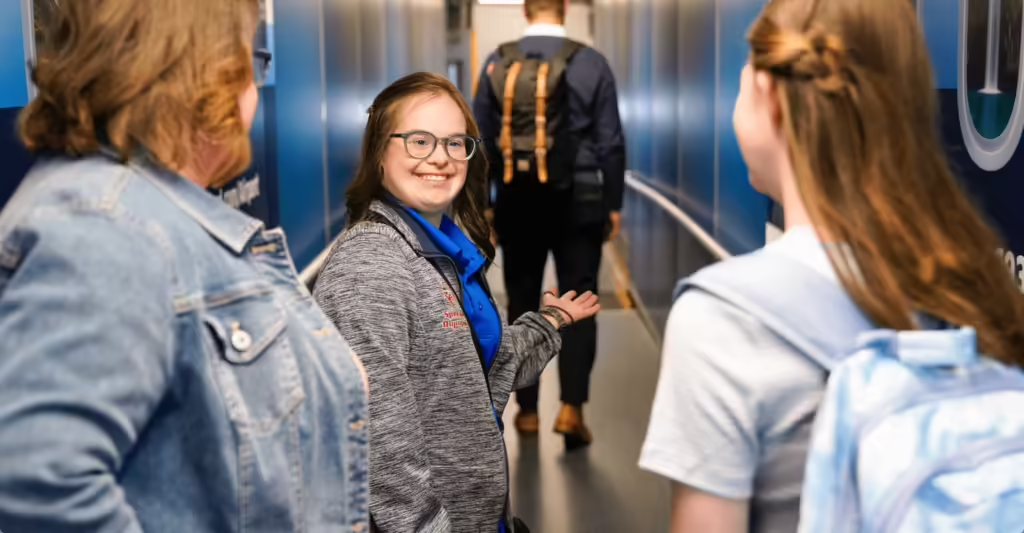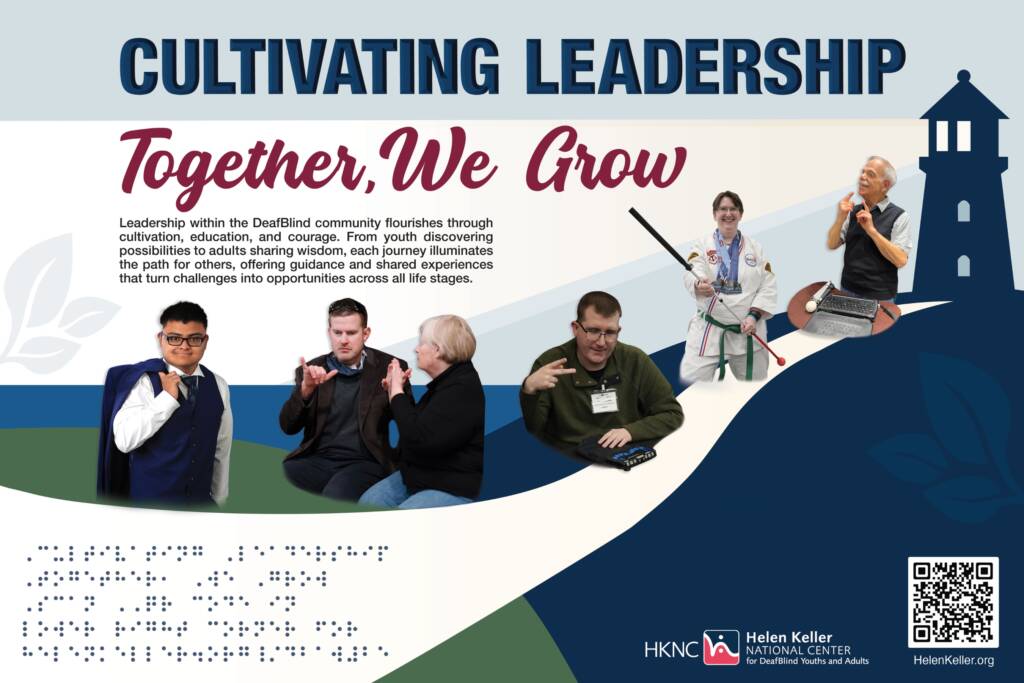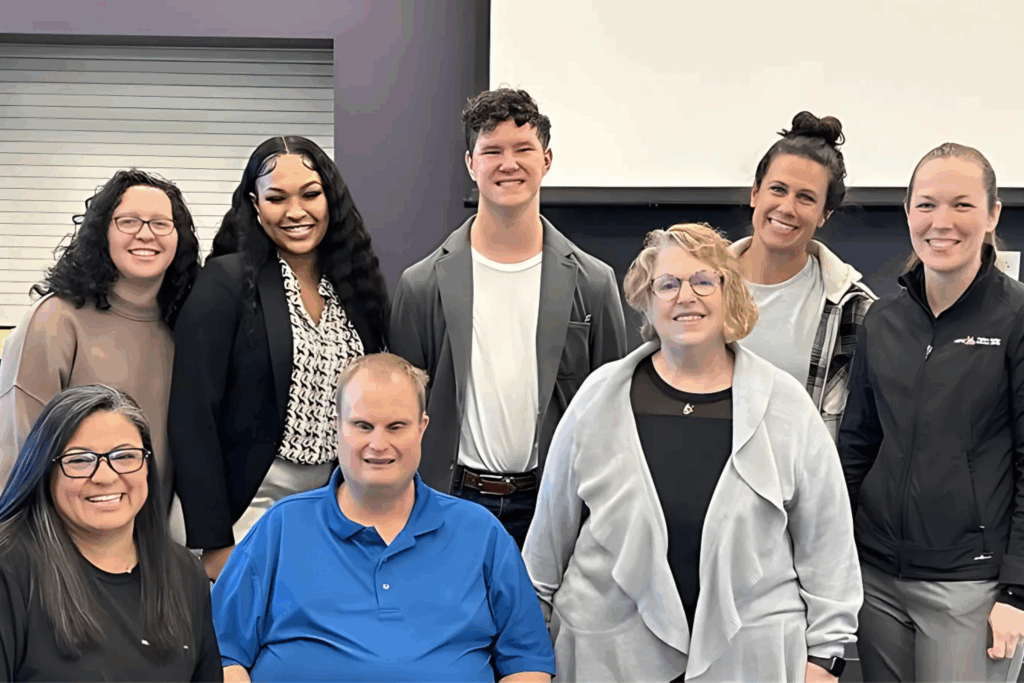Helen Keller Services Accessibility Symposium & Awards and United Airlines’ Recognition Featured in Forbes
Helen Keller Services’ 2024 Accessibility Symposium & Awards has been spotlighted in Forbes, celebrating United Airlines for their groundbreaking commitment to accessible travel. From braille placards on aircraft to inclusive digital platforms, United Airlines exemplifies innovation and leadership. This feature underscores the impact of our Symposium in fostering conversations on accessibility and recognizing companies driving transformative change.

We are thrilled to have our 2024 Accessibility Symposium and Awards featured in Forbes! This recognition underscores the significant impact of Helen Keller Services in shaping accessibility conversations across industries and celebrates United Airlines’ exceptional commitment to accessible travel.
From pioneering braille placards on aircraft to creating inclusive digital platforms, United Airlines exemplifies innovation and leadership. As our CEO, Sue Ruzenski, shared: “United stood out in terms of the values they were putting forth. They walk the walk.”
Read the full Forbes article by Steven Aquino, exploring how United Airlines and other leaders are driving transformative change.
Inside United Airlines’ Work In Making Air Travel Accessible To Everyone
Article written By Steven Aquino for Forbes
Late last month, New York disability rights organization Hellen Keller Services (HKS) held its Accessibility Symposium and Awards. The event, held virtually, is described on the HKS website as “a transformative event where technology leaders, industry experts, and advocates unite to shape the future of accessibility.” This year’s keynote address was given by Procter & Gamble’s accessibility leader Sumaira Latif, with other presenters including Joe Strechay. Strechay has been featured a couple times in this column, most recently a year ago when I interviewed him about his work on the Netflix limited series All The Light We Cannot See. Among the companies honored were Apple and Be My Eyes.
Another noteworthy company honored at this year’s Accessibility Symposium is United Airlines. HKS lauded United for its commitment to making the travel experience as accessible as possible to people with disabilities. One such accomplishment for United is becoming the first major American airline to install Braille placards in aircraft cabins, making moving about the plane accessible to Blind and low vision passengers. Likewise, United’s app on iOS and Android and in-flight entertainment system supports various assistive technologies, such as screen readers, in order to make the airline’s digital goods accessible.
“Our top priority at United is providing a safe and comfortable journey for all our customers, especially those who require some additional assistance,” Peter Wolkowski, United’s director of onboard products and partnerships, said in a recent interview. “It’s part of kind of what we do at United—whether that’s at the airport, on board our aircraft, or even employees. United has an employee business resource group for people of all abilities, and we work closely together to create a workplace environment where everyone can achieve their maximum potential.”
Adam Lang, product manager of United’s mobile app, stated the obvious: United is a for-profit business! But its business, he said, is “moving people around the world.” If the company does its job well, Lang said, then every person, disabled or not, has greater access to the world. If they do it poorly, then “we’ve closed the door on somebody being able to see the world,” he said. Lang described his introduction to accessibility began years ago when a Blind co-worker challenged him to assess the accessibility of digital products by asking yourself how they would work if the visual element were taken away. The same goes for the other senses. Lang said his team ask these questions every time they build something in the app, adding every feature “are available to folks with any particular disability because it’s equally accessible to anyone.”
Lang kept with the “United is a big brand” theme, telling me the company hears about its accessibility efforts from its own people internally as often as it does from external sources. Feedback, he said, comes fast and furiously, with company researchers also seeking out people from the disability community to provide input on accessibility.
Charles Hobart, senior manager of global response communications at United, told me United has continually discovered accessibility features benefit everyone, regardless of ability. He spoke of the Americans with Disabilities Act’s inception in 1990, pointing to how curb cuts on sidewalks not only help Blind or low vision people, or someone in a wheelchair, but also parents pushing strollers across the street. Hobart said while United is committed to making the travel experience better for all customers, it’s of particular poignance—arguably even more so—for the company to make it so for members of the disability community.
By signing up, you agree to receive this newsletter, other updates about Forbes and its affiliates’ offerings, our Terms of Service (including resolving disputes on an individual basis via arbitration), and you acknowledge our Privacy Statement. Forbes is protected by reCAPTCHA, and the Google Privacy Policy and Terms of Service apply.
For Helen Keller Services’ chief executive officer Susan Ruzenski, the organization’s decision to honor United came down to enabling independence. In a recent interview, she explained the company learned about the airline’s accessibility efforts in a trade magazine, where they read about United’s aforementioned Braille signage. HKS, Ruzenski told me, “always looking for companies that really put accessibility out there [and] see the importance of it.” Ruzenski’s team was thoroughly impressed by all United does for the disability community, both internally and externally. The airline’s efforts in this realm are important, she added, because they promote agency and autonomy in travel. As Lang said on multiple occasions, United is a known quantity; that the company does work so hard to serve disabled people as best they can is a big deal, Ruzenski said. Nobody would call air travel a paragon of accessibility, so it’s Ruzenski’s hope that other companies follow United’s lead here such that eventually accessibility “is something that someday will be on every aircraft… it won’t even be a question.”
“United stood out in terms of the values they were putting forth,” Ruzenski said of the airline’s work in prioritizing accessibility. “They walk the walk, so we really appreciated their team.”
On its website, HKS, in existence since 1893 and “deeply rooted in Brooklyn,” describes its mission as “[enabling] individuals who are blind, DeafBlind, have low vision or combined hearing and vision loss to live, work and thrive in their community of choice.” Ruzenski said accessibility “is everyone’s responsibility” and emphasized her organization is “here as a resource.” The main reason HKS holds its Symposium and awards companies like United is because, according to Ruzenski, HKS is a believer in building community and educating people on the cruciality of accessibility. “Fostering those conversations and ensuring the voices of people with disabilities [are heard], it’s key to the development of changes and improvements that can be made,” she said.
For United’s part, both Lang and Wolkowski said the company is pleased by the recognition from Ruzenski and HKS. Lang said the award is a testament to the airline making “an actual impact” on people’s lives, which he called validating. Wolkowski told me it’s “extremely rewarding” to be touted, telling me the company challenged its suppliers with the Braille signage because the powers-that-be thought it so important.
“It’s a huge sense of accomplishment for our teams,” Wolkowski said.
As to the future, the United folks told me the recognition from HKS creates “a virtuous cycle” whereby the positive press motivates them to push harder on their work. All three men said the company’s overarching goal to is to keep pushing forward and keep being the airline of choice for disabled people. Lang said company leaders see accessibility as a “competitive advantage” and a key differentiator.
“Good accessibility is good business,” Lang said. “The more the public recognizes that and gives feedback, the more good work we can do.”
“[Accessibility] aligns with United’s core principles,” Hobart added.
For her part, Ruzenski hopes United’s anointment will spur more conversation in the travel industry about accessibility for the disability community. “There are so many opportunities [for dialogue] to really educate and that’s really part of what we do,” she said of her future hopes and dreams. “In doing so, that can open the door maybe to employment [and] to other possibilities. That’s central to what we do.”
Article Source: https://www.forbes.com/sites/stevenaquino/2024/11/18/inside-united-airlines-work-in-making-air-travel-accessible-to-everyone/


